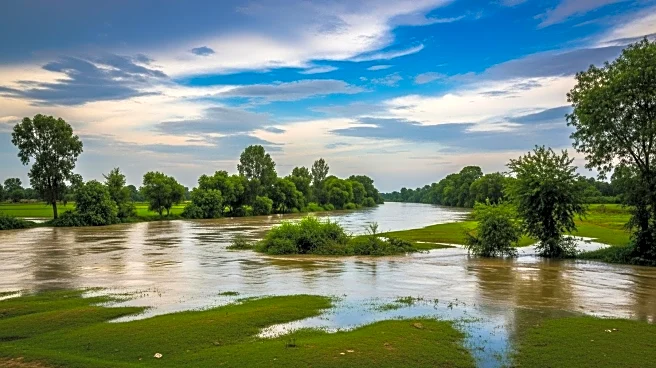What is the story about?
What's Happening?
Pakistan's eastern Punjab province is experiencing its most severe flood in history, affecting approximately 2 million people. The flooding has been exacerbated by global warming, which has intensified monsoon rains, leading to flash floods and landslides. The situation worsened when India released excess water from its swollen rivers and dams, causing cross-border flooding into Pakistan's low-lying areas. Local authorities are actively evacuating residents and utilizing educational institutions and security facilities as rescue camps. The Foreign Ministry of Pakistan is gathering data on India's water release, although India has not commented on the matter. Punjab, a crucial agricultural region and the country's main wheat producer, has received 26.5% more monsoon rain compared to the previous year, raising concerns about food shortages.
Why It's Important?
The flooding in Punjab has significant implications for Pakistan's agriculture and food security. As a major wheat-producing region, the destruction of crops due to flooding could lead to severe food shortages, impacting the nation's economy and food supply chain. The situation highlights the vulnerability of Pakistan to climate change, with increased monsoon rains posing a threat to both human lives and agricultural productivity. The diplomatic tension between India and Pakistan over water management further complicates the issue, potentially affecting regional stability. The disaster management efforts and international cooperation will be crucial in mitigating the impact and preventing future occurrences.
What's Next?
Authorities in Multan are preparing for a potential 'super flood' by installing explosives at key embankments to divert water if necessary. The disaster management authority continues to monitor the situation, with drones being used to oversee low-lying areas. Efforts to evacuate residents and protect livestock are ongoing, as the monsoon season is expected to last until the end of September. The government may need to implement long-term strategies to address climate change impacts and improve infrastructure to handle such natural disasters more effectively.
Beyond the Headlines
The flooding in Punjab underscores the broader challenges posed by climate change, particularly in regions heavily reliant on agriculture. The increased frequency and intensity of natural disasters could lead to long-term shifts in agricultural practices and water management policies. Ethical considerations regarding cross-border water management and the responsibility of nations in mitigating climate change effects are likely to be debated. The situation may also prompt discussions on international aid and support for countries facing climate-related challenges.















